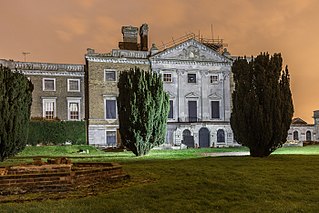
Richard Edgcumbe,1st Baron Edgcumbe,of Mount Edgcumbe in Cornwall,was an English Whig politician who sat in the English and British House of Commons from 1701 until 1742 when he was raised to the peerage as Baron Edgcumbe. He is memorialised by Edgecombe County,North Carolina.

John Smith (1656–1723) of Tedworth House,Hampshire,was an English politician who sat in the English and British House of Commons between 1678 and 1723. He served as Speaker and twice as Chancellor of the Exchequer.

Lord James Cavendish FRS of Staveley Hall,Derbyshire was a British Whig politician who sat in the English House of Commons and the British House of Commons. He was a son of the 1st Duke of Devonshire and a member of the Cavendish family.
Nicholas Lechmere,1st Baron Lechmere was an English lawyer and Whig politician who sat in the House of Commons from 1708 until 1721 when he was raised to the peerage as Baron Lechmere. He served as Attorney-General and Chancellor of the Duchy of Lancaster.

Walter Chetwynd,1st Viscount Chetwynd,of Rudge and Ingestre,Staffordshire was a British Whig politician who sat in the House of Commons between 1702 and 1734.

Sir John Eyles,2nd Baronet of Gidea Hall in Essex,was a British financier and politician who sat in the House of Commons from 1713 to 1734. He was Lord Mayor of London in 1726. He served as a Director of the East India Company 1710-14 and again 1717-21 and was appointed a sub-governor of the South Sea Company in 1721.
Sir Robert Fagge,3rd Baronet,of Wiston,near Steyning,Sussex,was an English politician who sat in the House of Commons from 1708 to 1710.
Sir Richard Sandford,3rd Baronet was an English landowner and Whig politician who sat in the English House of Commons between 1695 and 1707,and in the British House of Commons from 1708 to 1723.

Sir Edward Ernle,3rd Baronet of Charborough in Dorset,of Brimslade Park and Etchilhampton,both in Wiltshire,was an English Whig politician who sat in the English and British House of Commons between 1695 and 1729. He had mixed fortunes in finding or holding a seat and often depended on his father-in-law to bring him into his own seat at Wareham when a vacancy arose.
Samuel Shepheard (1677–1748),of Exning,Suffolk,near Newmarket,Cambridgeshire,was an English Tory politician who sat in the English House of Commons in 1701 and in the British House of Commons almost continually for forty years from 1708 to 1748.
Major Anthony Morgan of Freshwater,Isle of Wight was a British Army officer,and Whig politician who sat in the House of Commons between 1695 and 1729. He was a Lieutenant-Governor of the Isle of Wight.
Thomas Freke,of Hannington,Wiltshire,was an English Whig politician who sat in the English and British House of Commons between 1685 and 1710.
John Rudge,of Mark Lane,London and Evesham Abbey,Worcestershire,was a London merchant and financier,and Whig politician who sat in the House of Commons almost continuously between 1698 and 1734. He was a Governor of the Bank of England from 1713 to 1715.

Sir Thomas Webster,1st Baronet,of Copped Hall,Essex,and Battle Abbey,Sussex,was a British landowner and Whig politician who sat in the English and British House of Commons between 1705 and 1727.
Sir Humphrey Briggs,4th Baronet,of Haughton,Shropshire,was an English Whig politician who sat in the English and British House of Commons between 1701 and 1727.
Sir John Cope,6th Baronet (1673–1749),of Bramshill,Hampshire,was a British banker and Whig politician who sat in the English and British House of Commons for 36 years from 1705 to 1741. He was a Director of the Bank of England from 1706 to 1721.

Sir Arthur Owen,3rd Baronet,of Orielton,Pembrokeshire,was a Welsh Whig politician who sat in the English and British House of Commons between 1695 and 1727.
George Pitt,of Strathfield Saye,Hampshire,was an English landowner and Tory politician who sat in the House of Commons between 1694 and 1727.
Sidney Wortley Montagu,of Wortley,Yorkshire and Walcot,Northamptonshire,was a British coal-owner and Whig politician who sat in the English and British House of Commons between 1679 and 1727. He was one of the leading coal owners in the North-East and a member of powerful coal cartels. Although he served in Parliament over a long period,his contributions there were limited.








